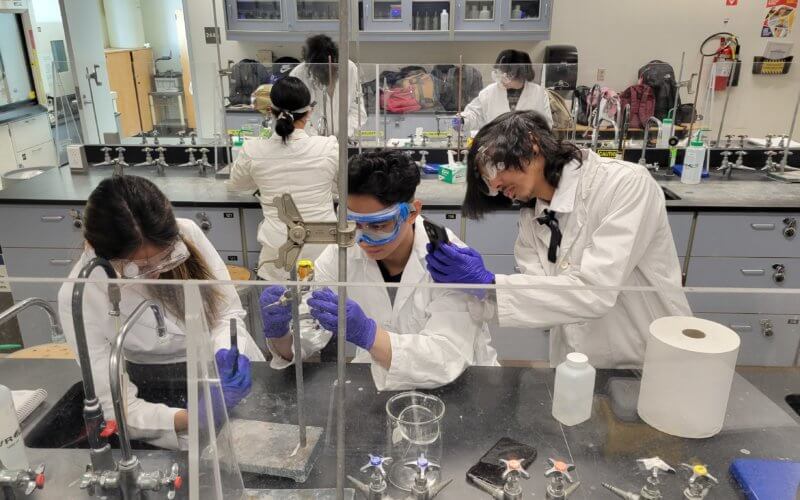
In the fall of 2023, chemistry and biochemistry faculty members Allyson Fry-Petit and Joya Cooley ran a pilot of the course-based undergraduate research experience (CURE) in two lab sections of General Chemistry 2 to teach students resilience while engaging them in novel chemistry research. The CURE brings meaningful research experiences into teaching. The CURE engages students in scientific discovery in a genuine way, versus traditional teaching labs, which focus on making observations that are well-prescribed and lack novel discovery.
The CURE centered on the largest problem of this century: “How will we address climate change?” It is well established that combating climate change requires an interdisciplinary approach. One strategy is using sources of energy other than burning fossil fuels. In the CURE, teams of students worked together to design, synthesize and test abundant oxide-based inorganic materials for their potential to split water to form hydrogen gas as an alternative to fossil fuels. At the end of the term, the research teams presented their novel findings via a poster presentation in their “Celebration of Learning.” Several students presented that they had found brand-new materials that had not been previously made. Further, follow-up research on these materials will continue in subsequent semesters of the CURE with the aim of publishing the students’ findings.
The first-semester pilot of 48 students has shown to be a success that should be expanded to additional sections in subsequent academic years. Students who participate in the CURE are performing as well or better than their peers who do not participate in the CURE as measured by an end-of-semester standardized exam. Students have shown and self-reported building problem-solving skills, developing resilience and understanding that setbacks are often learning opportunities. Moreover, many indicated a sense of belonging in science and an interest in continuing to explore research experiences at CSUF and in their further education and careers. Initial results also suggest a decrease in the equity gap in those students participating in the CURE. As summed up by a quote from a kinesiology major, the CURE is having a positive impact: “I truly loved the whole process. I think I enjoyed it because I never had research experience to this degree, so it was a good learning experience. Plus, being able to do the research poster talk was more rewarding than I thought.”
Additional instrumentation is needed to expand the CURE. Thus, the CURE is looking to raise $30,000 and welcomes support on the March 6 #TitansGive day of giving.